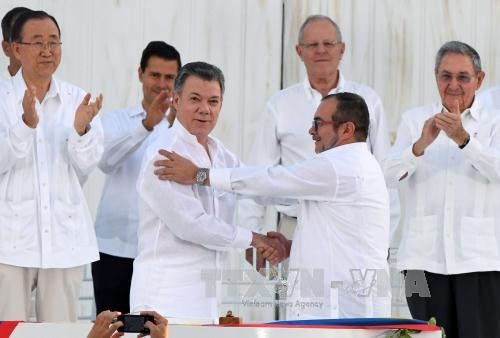(VOVworld) – Colombians voted against a new peace accord in a referendum this week. But there appear positive signals for the unrealized peace road-map in Colombia.
 |
Colombian President Juan Manuel Santos (L) and FARC leader Timoleon Jimenez (R) signed a peace deal on September 26, in Cartagena, Colombia (Photo: AFP/VNA)
|
On October 2, the Colombian people voted on whether to approve on a deal between the government and the Revolutionary Armed Forces of Colombia (FARC) which would end 52 years of war. Colombian President Juan Manuel Santos said the referendum was to ensure the legality of the deal.
On August 24, after 4 years of negotiations, the Colombian government and FARC reached a peace agreement. If approved, the deal would pave the way for 8,000 FARC fighters to disarm, re-enter society, and form a political party. Chief negotiator for the government Humberto de la Calle said the August 24 deal is not perfect, but it is the most feasible and best way for Colombia to advance to a brighter future.
Unexpected outcome
A public poll before the referendum showed that support for the deal running between 55% and 66%. President Santos had said his government has no contingency plan in case the voters said “no” to the deal, because the ruling party firmly believed the deal would be approved. The government hoped that peace would encourage investment in gold mining, oil exploration, and agriculture in Colombia, the 4th largest economy in Latin America.
In a surprise reversal, 50.2% of Colombian voters rejected the peace deal. The opposition camp led by former Presidents Andres Pastrana and Alvaro Uribe said if the agreement would pardon the fighters to be pardoned and undercut the fight against drugs. FARC would legally participate in Colombia’s politics as a political party and could compete in the presidential and parliamentary elections in 2018, possibly securing 10 seats in the parliament by 2026. This is unthinkable to the opponents because, since the armed conflict broke out in 1964, 260,000 people have been killed, 45,000 people have gone missing, and 6.9 million people have fled their homes. Former Vice President Francisco Santos, who opposed the peace deal, said he wants a better agreement.
Continuing efforts
One day after the result of the referendum was announced, President Santos pledged continued efforts to end the 52-year war. In a televised speech, Santos said he will pursue peace until the “last day of his term.” He also called on chief negotiator Calle and Peace Commissioner Sergio Jaramillo to return to Havana, Cuba, to meet with leaders of FARC. The force immediately pledged to continue peace negotiations with the government and respect the bilateral ceasefire.
The moderate reactions from both sides have been praised by the international community. UN Secretary General Ban Ki-moon offered his full support for the peace process, saying he will continue to work with Colombia until an agreement is reached. UN special envoy Jean Arnault was sent to Cuba to explore the possibilities for further talks. Ecuador, Argentina, and Venezuela said they support Colombia’s goodwill.